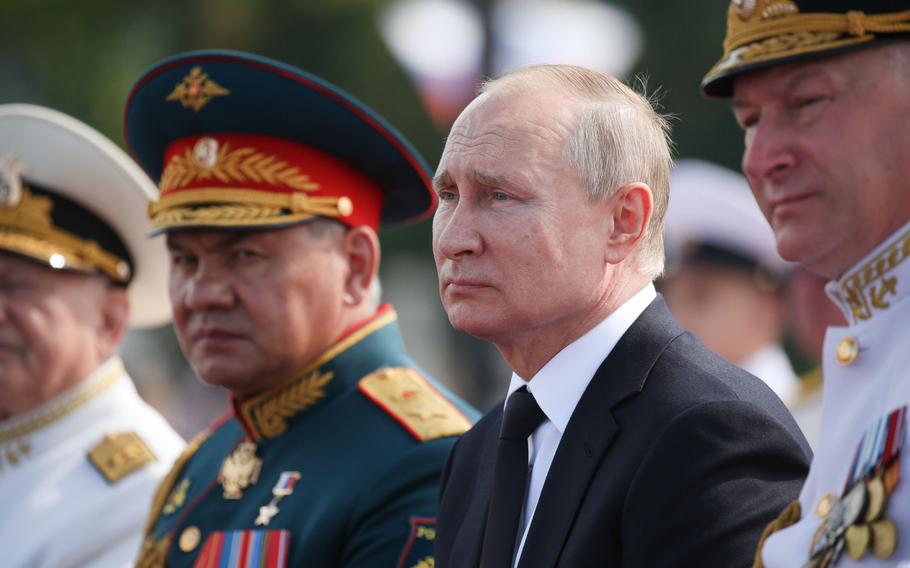
Vladimir Putin, Russia’s president, center, sits alongside Sergei Shoigu, Russia’s defense minister, second left, during the Russian Navy day in St. Petersburg, Russia, on July 28, 2019. (Andrey Rudakov/Bloomberg)
In the latest indication of expanded state secrecy in wartime Russia, President Vladimir Putin on Monday signed legislation that will exempt Russian lawmakers from a previous requirement that they disclose details of their income, expenses and property.
The law, which will come into effect on March 1, will still require members of parliament to submit an income declaration, but in a summarized format without any personal data. Previously, information about deputies and senators' income was posted annually before April 1.
The Kremlin spokesman, Dmitry Peskov, has defended the change in disclosure rules, citing the imperatives of the war in Ukraine, which Russian officials call a "special military operation."
The move to exempt Russian lawmakers from disclosure requirements they long disdained, and that often raised questions about how some accumulated unusual wealth, comes as Ukrainian President Volodymyr Zelenskyy has undertaken an aggressive anti-corruption sweep in recent days, aimed at assuring Western backers that billions in economic aid and donated weapons will be well-managed.
Moscow's new law was adopted in the State Duma, Russia's lower house of parliament, by a large majority: with only 24 of 450 lawmakers against it, and 18 abstaining.
One of the bill's architects, Pavel Krasheninnikov, told the Russian daily Komsomolskaya Pravda that the requirement to publish income had dissuaded public figures and business executives from running for office.
"Among other things, that's why — that you 'have to mess around' with the paperwork and filing. You see, simply put, not everyone wants to do it. … They are lazy. … People do not want to show their income," Krasheninnikov said.
Peskov insisted last month that the new law would not affect the state's "fight against corruption."
But anti-corruption advocates say that since Russia's invasion of Ukraine, many formerly public state databases and documents have gone dark. Even basic economic data is now being kept secret.
"Weirdly enough, Russia was one of the most transparent jurisdictions to carry out investigations in," Maria Pevchikh, who leads the investigation team at opposition figure Alexei Navalny's Anti-Corruption Foundation, said in an interview.
"Now they have stopped everything," Pevchikh said. "They have stopped publishing declarations, tax returns for government officials. They have started to partially censor the register of legal entities, the companies house … the land registry."
With the world's eyes focused on Russia's onslaught in Ukraine, Pevchikh speculated that war has emboldened the Kremlin to gradually remove anti-corruption checks and balances.
"When you are committing genocides with one hand, no one really cares what you are doing with the other hand," she said.
Last year, Russia, as has been typical, achieved a poor score on Transparency international's annual Corruption Perceptions Index, ranking 137 out of 180 countries.
Some pro-war hawks in Russia have complained that a string of battlefield defeats were due at least in part to corruption in the Defense Ministry and the military leadership that left units ill-equipped. Some have accused commanders of hiding the poor conditions during inspections by political leaders.
The shortcomings of Russia's regular military have forced the Kremlin to rely on soldiers for hire, including the Wagner mercenary group, which for months has a led a fierce assault on the eastern Ukrainian city of Bakhmut.
On Monday, the head of Wagner, business executive Yevgeniy Prigozhin, claimed to have flown on a Sukhoi SU-24 fighter jet during a bombing run on Bakhmut, which is known in Russian as Artemovsk.
In a video, Prigozhin appears to be flying through the night wearing a helmet and mask. "We are landing, we bombed Bakhmut," Prigozhin says to the camera, removing his mask. Prigozhin called on Zelensky to join the dogfight.
"Let's meet in the skies. If you win, we will give you Artemovsk. If not, we will go as far as Dnipro," Prigozhin said.
On Monday, a Moscow court also dismissed a Russian journalist's appeal in a libel lawsuit filed by Prigozhin two years ago, after the journalist described him as the "owner" of Wagner.
Prigozhin sued Ekho Moskvy editor in chief Alexei Venediktov for libel in June 2021 but last year publicly admitted that he had in fact founded the paramilitary group. This followed years of mounting evidence that he had founded the group, which Prigozhin had repeatedly denied.
Venediktov wrote on Telegram that the court had not explained why it dismissed the appeal. Also on Monday, Ukraine's parliament adopted a resolution denouncing Wagner.